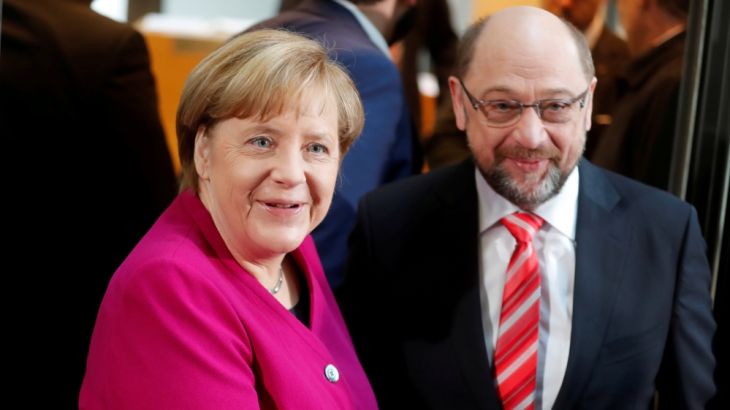
Merkel hopeful of renewed Germany coalition talks
Germany has been in political unrest for almost four months since a federal election in September failed to produce a government.
German Chancellor Angela Merkel has said she is optimistic of forming a coalition government after almost four months of political uncertainty since the country’s federal elections.
Talks between the country’s two major parties – Merkel’s Christian Democrat alliance (CDU/CSU) and the Social Democratic Party (SDP) – to form a new ruling coalition resumed in the capital, Berlin, on Sunday.
“I think we can do it. We will work very quickly, very intensively. That’s what we set out to do,” Merkel told reporters.
“I am optimistic about these talks, but I also know that there is a lot of work ahead of us in the coming days. We are willing to take on the work.”
The talks between the two former government allies come after an initial attempt by Merkel to form a ruling three-way coalition with the Free Democrats (FDP) and Green Party failed in November.
Tough process
Al Jazeera’s David Chater, reporting from Berlin, said post-war Germany had not experienced a similar situation before where a caretaker government had been in office for some four months.
He called the talks “critical”, adding that they were aimed at exploring areas where formal negotiations would take place.
A potential sticking point in the talks is the refugee crisis, with the two sides divided over whether to allow relatives of people who are already in Germany to join them.
In September’s poll, Merkel’s CDU/CSU secured 33 percent of the vote, down about nine percent compared with the previous election in 2013 – failing to form a single-party government.
The SPD, led by Martin Schulz, had consistently ruled out being part of another so-called grand coalition since scoring just 20.5 percent of the vote in September’s vote.
“Essentially, the Social Democrats received a lot of damage by being part of the previous grand coalition and gained nothing electorally,” said Chater.
“Even if they come to an agreement, the SPD will have a party delegation on January 21 where members will have to approve it – so even that has to go through another hurdle,” he added.
“This crisis is far from over.”
A faction called “NoGroKo”, or “no grand coalition”, has been formed within SDP to defend a stance against working with Merkel again following September’s election result.
Merkel has been the chancellor of Germany for the last 12 years.
A longer government vacuum in Europe’s largest and strongest economy might have an impact on several issues, including stability in the eurozone.